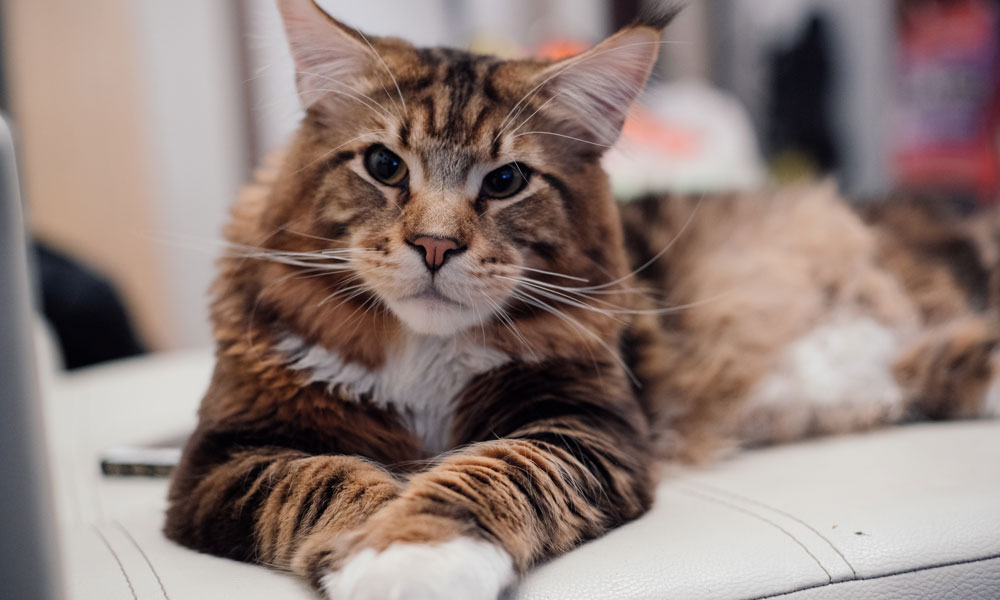What kind of pet does a Maine Coon cat make? Enthusiasts of the breed will readily tell you these giant fluffballs have gentle personalities, are tolerant around children and can handle living in households with other pets. Though they keep their distance at first when new people come around, they don’t stay away for long because they love companionship and a good ear scratching from their people. In fact, the Maine Coon has several personality traits that remind people of dogs. Friendly and loyal to their families, a Maine Coon will eagerly greet their humans at the door. They’re also willing to slip into the water for a swim (including your freshly filled bathtub). Some are known to perform simple tricks.
If you’re looking at adding a Maine Coon cat to your family, read on to learn all about them.
Fast facts about Maine Coon cats
Nickname: Gentle giant
Weight: Females weigh between 11-20 pounds, males weigh 15-25 pounds
Length: A Maine Coon cat can reach 40 inches. The longest cat in the Guinness Book of World Records reached 48.5 inches, from nose to tailbone.
Cool facts: The Maine Coon cat has a water-repellent coat and thick paws, making this breed well adapted for outdoor living. In fact, back in the 1800s, about 40% of kittens were born as polydactyls — with six toes. Possibly, that extra digit lends these felines an improved ability to walk on the snow. Because six-toed cats don’t qualify for purebred competitions, this trait was actively bred out, making polydactyl kittens much less common nowadays.
History and origin: The Maine Coon cat is the only house cat that is considered native to North America. Some theorize (jokingly, we hope) that Coon cats are the result of an interspecies union between a feral cat and a raccoon. That, of course, would be biologically impossible.
Another origin story claims they’re descendants of the six beloved long-haired felines belonging to Marie Antoinette. Legend has it the embattled French monarch had them shipped to Wiscasset, Maine, before her execution.
Here’s the likely truth: Scientists have discovered that Maine Coon cats have a genetic link to the Norwegian Forest cat, thanks to the Viking explorers who more than likely introduced these hefty long-haired cats to North America.
Accomplishments: In 1895, Cosie the Maine Coon won best in show at the first-ever cat competition in New York’s Madison Square Garden. Coon cats were highly sought after by feline aficionados until their popularity was displaced by Persian cats, another long-haired breed. In the latter half of the 20th century, the enthusiasm for the breed has rebounded. In 2019, the Maine Coon was declared the fifth-most-popular cat breed of 2018 by the Cat Fanciers’ Association. In 1985, it became the official state cat of Maine.
Are Maine Coon cats the largest house cats?
Many sources will claim that Maine Coons are the world’s largest house cats. They do get long and heavy, striking some majestic lion-like poses with their elongated snouts and “big hair” looks. However, the Ragdoll is actually a larger breed on average.
How do you care for a Maine Coon cat?
These long-haired cats have a shaggy, uneven coat that’s soft and silky to the touch and lends them a fluffy appearance. Daily brushing will keep their fur in good condition, and keep the number of hairballs in check. Given their friendly, easy-going natures and attachment to their humans, they’ll likely find these grooming sessions enjoyable, as long as you’re gentle.
Are allergies more likely with a Maine Coon cat?
If you or the humans in your life have allergies to cats, don’t rule out the Maine Coon cat simply because it has long hair. Scientists now believe the culprit behind the congestion isn’t hair or dander but a skin protein that cats release called FEL D 1. As it turns out, longer hair may have something of a filtering effect, blocking the release of some proteins into the air. Also, female cats release fewer FEL D 1 proteins than males. However, it’s important to note that a Maine Coon is not a hypoallergenic breed. Spending time with the cat is the best way for an allergy sufferer to determine how well they can tolerate the cat.
How do you maintain a healthy weight for a Maine Coon cat?
Because these felines are super-connected to their people, it can be easy to overindulge on the treats. Factor in that pudge-disguising coat of fur, and weight gain can sneak up on your Maine Coon. To help your cat live a long, healthy life, regular weigh-ins are a must for this breed.
Like any cat, offer them plenty of exercise and make time for play. (For more on this topic, listen to Raising Your Paws, episode 35: How to play in order to engage your cat’s hunting sequence — the most enriching form of play for your cat.)
At mealtimes, be diligent with proper portioning by using a scale or measuring scoop to ensure your cat is getting a balanced meal. And as always with felines, feed wet food if possible, as cats tend to not compensate their diet with proper water intake. If your cat needs to lose a few pounds, check out our guide to helping pets lose weight the safe way.
NutriSource cat diets are the purr-fect choice for any pet parent who wants to help their feline friend look and feel their best. Every bag and can is packed with Good 4 Life, a unique blend of supplements that offers your cat all the minerals and nutrients they need to build a healthy body from the inside out. If you’re looking for fewer hairballs and litter box odors, you’ll want to grab a bag today! Discover more benefits Good 4 Life offers your pet, and look for NutriSource at your local, independent pet supply retailer.


